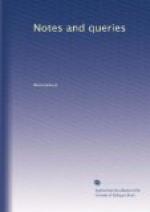Alfred Gatty
* * * * *
SHAKSPEARE’S USE OF THE WORD “DELIGHTED”.
If the passage from Measure for Measure, which has been the subject of much controversy in your recent numbers, be read in its natural sense—there is surely nothing unintelligible in the word “delighted” as there used.
The object of the poet was to show how instinctively the mind shudders at the change produced by death—both on body and soul; and how repulsive it must be to an active and sentient being.
He therefore places in frightful contrast the condition of each before and after that awful change. The BODY, now endowed with “sensible warm motion,” to become in death “a kneaded clod,” to “lie in cold obstruction, and to rot.” The SPIRIT, now “delighted” (all full of delight), to become in death utterly powerless, an unconscious—passive thing—“imprisoned in the viewless winds, and blown with restless violence round about the pendant world,” how intolerable the thought, and how repulsive the contrast! It is not in its state after death, but during life, that the poet represents the spirit to be a “delighted one.” If we fall into the error of supposing him to refer to the former period, we are compelled to alter our text, in order to make the passage intelligible, or invent some new meaning to the word “delighted,” and, at the same time, we deprive the passage of the strong antithesis in which all its spirit and force consists. It is this strong antithesis, this painfully marked contrast between the two states of each, body and spirit, which displays the power and skill of the poet in handling the subject. Without it, the passage loses half its meaning.
MR. HICKSON will not, I hope, accuse one who is no critic for presuming to offer this suggestion. I tender it with diffidence, being conscious that, although a passionate admirer of the great bard, I am all unlearned in the art of criticism, “a plain unlettered man,” and therefore simply take what is set before me in its natural sense, as well as I may, without searching for recondite interpretations. On this account, I feel doubly the necessity of apologising for interfering with the labours of so learned and able a commentator as MR. HICKSON has shown himself to be.
L.B.L.
* * * * *
VENTRILOQUISM
(Vol. ii., p. 88.)
Plutarch (tom. ii., p. 397.D.) has these words:
[Greek: “Ou gar esti theou hae gaerus oude ho phthoggos, oude he lexis, oude to metron, alla taes yunaikos: ekeinos de monas tas phantasias paristaesi, kau phos en tae psuchae poiei pros to mellon.”]
If that be the passage referred to be Rollin, nothing is said there about ventriloquism. The Scholiast on Aristoph. (Plut. 39.) tells us how the Pythian received the afflatus, but says nothing about her speaking from her belly: He only has




